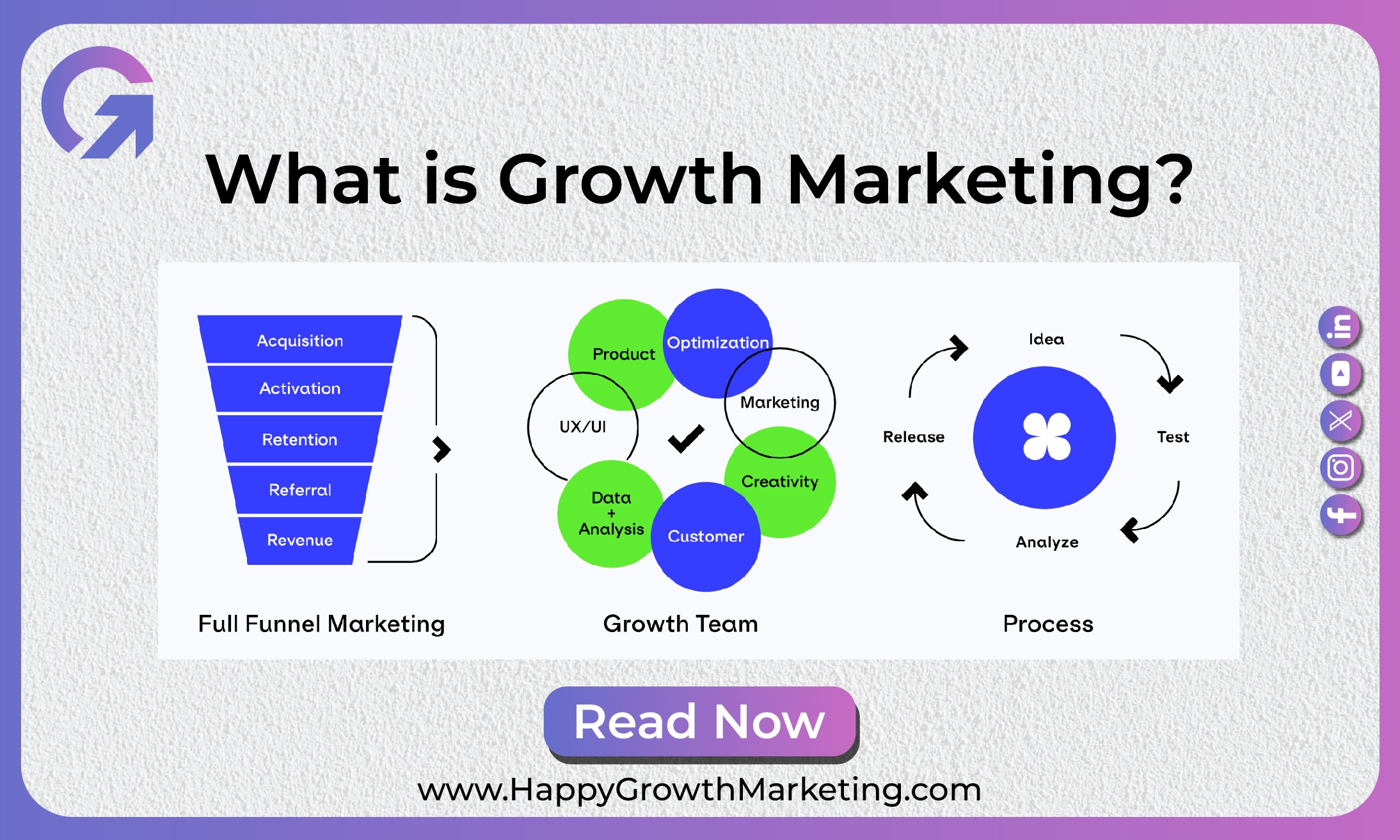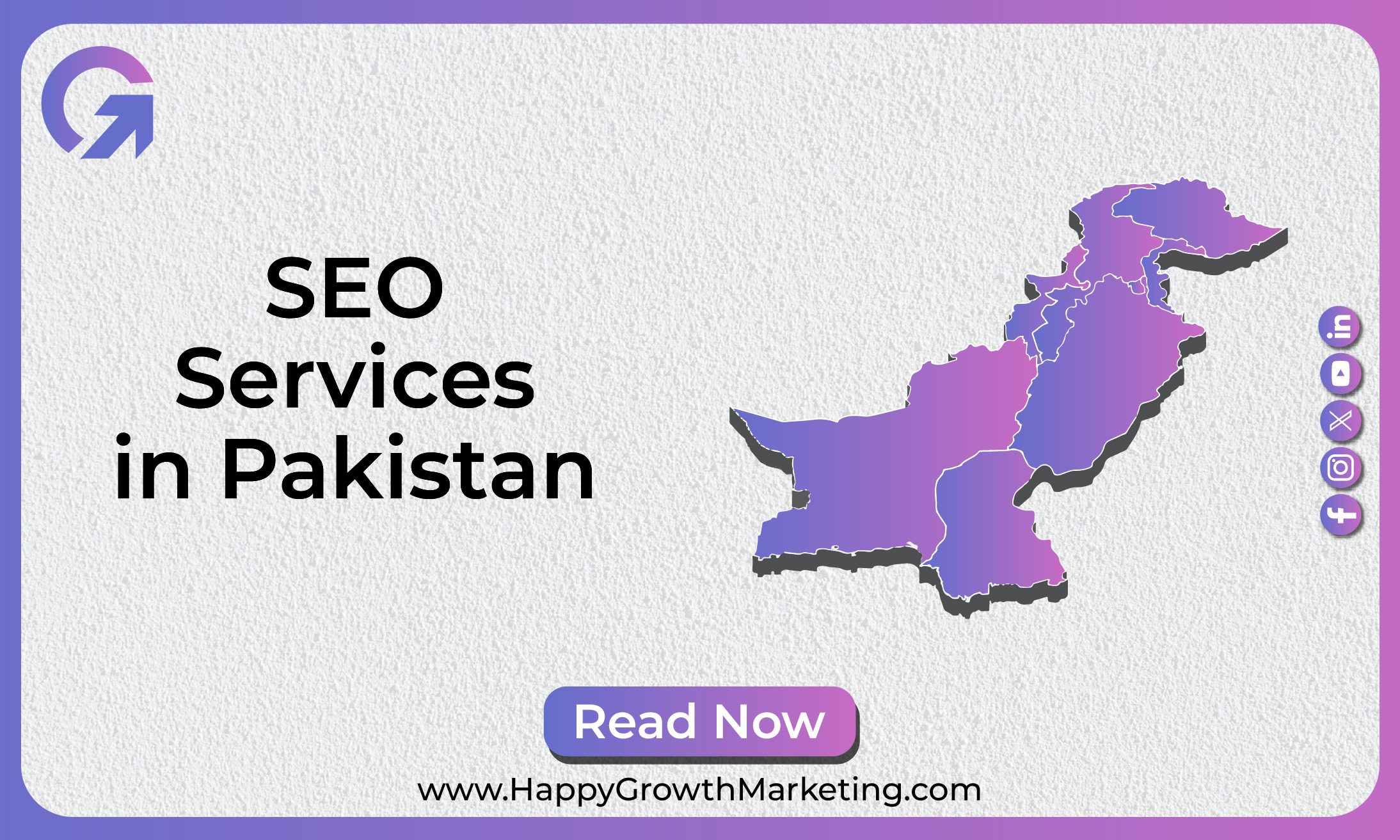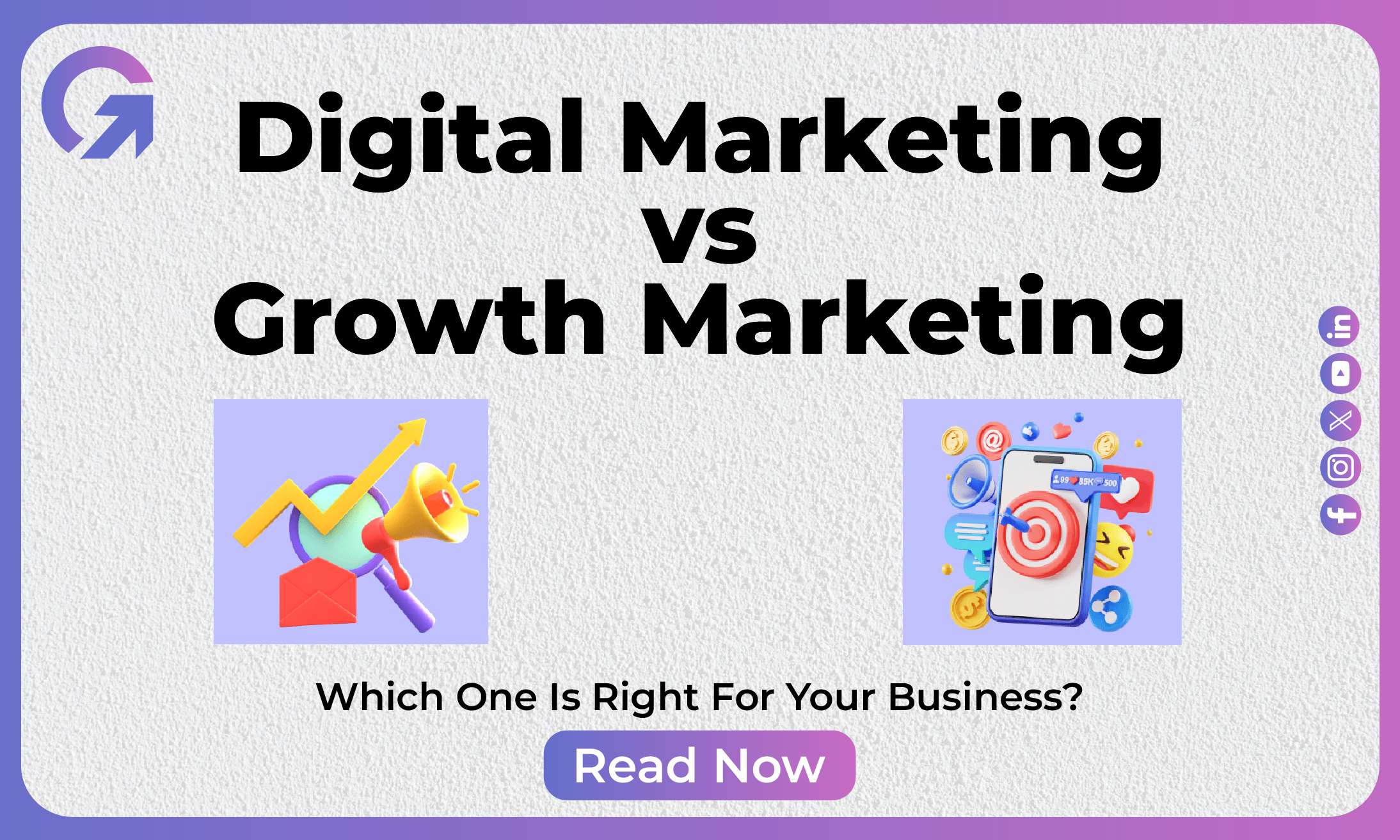Introduction
In today’s fiercely competitive business landscape, traditional marketing methods alone often fall short in driving sustained growth. Enter growth marketing, a dynamic and data-driven strategy that has revolutionized how businesses approach customer acquisition, retention, and revenue generation. In this comprehensive guide, we’ll delve deep into the world of growth marketing, exploring its definition, evolution, key components, strategies, case studies, challenges, and future trends.
Defining Growth Marketing
Growth marketing is not just another buzzword; it’s a paradigm shift in marketing strategy. Unlike traditional marketing, which often focuses solely on brand awareness and lead generation, growth marketing takes a holistic approach, encompassing the entire customer journey. It leverages data analytics, experimentation, and cross-functional collaboration to drive sustainable business growth.
Growth marketing is about making customers happy and keeping them coming back. It’s a smart plan for the future, where being genuine and interacting with customers turns them into fans and boosts how much they spend over time.
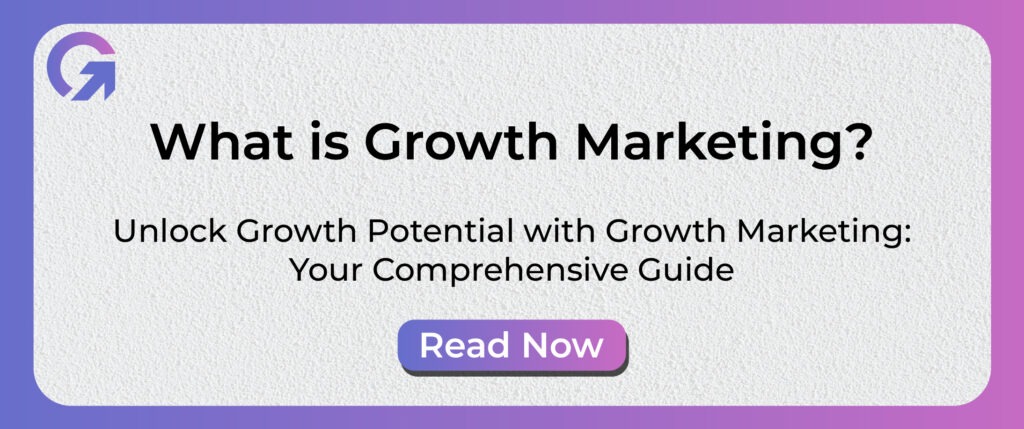
The Evolution of Growth Marketing
The roots of growth marketing can be traced back to the concept of “growth hacking,” popularized by tech startups in the early 2000s. However, what started as a set of guerrilla marketing tactics has evolved into a sophisticated and comprehensive strategy. Today, growth marketing is characterized by its emphasis on scalability, measurability, and continuous optimization. Current trends in growth marketing include personalized customer experiences, AI-driven automation, and omnichannel integration.
Key Components of Growth Marketing
Successful growth marketing hinges on several key components:
Cross-Functional Collaboration:
Alignment between marketing, sales, and product teams is crucial for optimizing the entire customer journey. By breaking down silos and fostering collaboration, growth marketers ensure a seamless experience for users from awareness to conversion.
Data-Driven Decision-Making:
Analytics, A/B testing, and experimentation form the backbone of effective growth marketing strategies. By analyzing user behavior, tracking key metrics, and iterating based on insights, growth marketers make informed decisions that drive results.
Full Funnel Focus:
Growth marketers don’t just focus on acquiring customers; they aim to optimize every stage of the funnel:
Awareness: Attracting potential customers through targeted marketing efforts.
Acquisition: Converting leads into users through compelling offers and seamless onboarding processes.
Activation: Ensuring users have a positive initial experience to drive engagement.
Retention: Keeping users coming back for more through personalized communication and value-added services.
Revenue: Maximizing customer lifetime value through upsells, cross-sells, and subscription models.
Referral: Turning satisfied customers into brand advocates through incentivized referral programs.
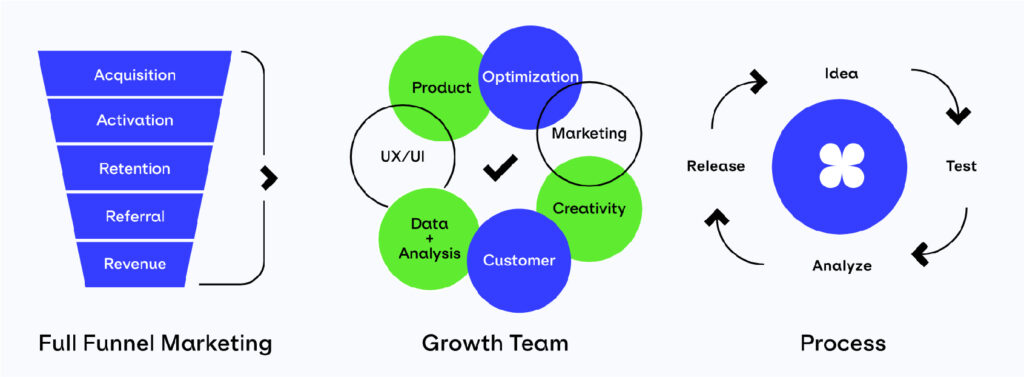
Strategies for Effective Growth Marketing
Several strategies can turbocharge your growth marketing efforts:
Referral Programs:
Harness the power of word-of-mouth marketing by incentivizing existing customers to refer their friends and family. Whether it’s a discount, exclusive content, or early access, referrals can significantly expand your user base.
A/B Testing:
Continuously optimize your campaigns by testing different variables (such as headlines, CTAs, or landing page layouts) and analyzing the results. Data-driven experimentation helps you fine-tune your approach and improve conversion rates.
User Onboarding:
Invest in a seamless onboarding experience to increase user retention and lifetime value. Clear instructions, personalized guidance, and proactive support contribute to long-term user satisfaction.
Case Studies
Real-world examples demonstrate the effectiveness of growth marketing:
Dropbox:
A classic example of how a simple referral program fueled explosive user growth. By incentivizing existing users to refer new users, Dropbox achieved remarkable organic growth without massive advertising budgets.
Airbnb:
Leveraged data-driven insights to personalize the user experience and drive engagement. Their recommendation engine, based on user behavior and preferences, significantly increased bookings and customer satisfaction.
Challenges in Growth Marketing
Despite its effectiveness, growth marketing comes with its fair share of challenges:
Resource Allocation:
Limited budgets and competing priorities can hinder growth marketing initiatives. Finding the right balance between experimentation and stability is crucial.
Over-Optimization:
Focusing too much on short-term gains can lead to burnout and diminishing returns. Growth marketers must avoid chasing quick wins at the expense of long-term sustainability.
The Future of Growth Marketing
The future of growth marketing is bright, with emerging trends reshaping the landscape:
AI-Driven Personalization:
Customized experiences powered by artificial intelligence will enhance user engagement and conversion rates.
Voice Search Optimization:
As voice assistants become more prevalent, optimizing for voice search will be essential.
Predictive Analytics:
Anticipating user behavior and needs through predictive models will drive targeted marketing efforts.
To stay ahead of the curve, businesses must embrace agility, adaptability, and a culture of continuous learning.
Conclusion
Growth marketing is not a one-size-fits-all solution; it’s a mindset that prioritizes innovation, experimentation, and customer-centricity. By implementing the strategies outlined in this guide and staying abreast of emerging trends, businesses can unlock their full growth potential in today’s dynamic marketplace. Embrace growth marketing, and watch your business soar to new heights.
Most Popular Questions
Frequently Asked Questions (FAQs)
Growth marketing is a data-driven approach focused on accelerating business growth by optimizing every stage of the customer journey. Unlike traditional marketing, which often emphasizes brand awareness and lead generation, growth marketing encompasses a holistic strategy that includes customer acquisition, retention, and revenue generation. It relies heavily on analytics, experimentation, and cross-functional collaboration to identify scalable growth opportunities and drive sustainable business growth.
A prime example of a growth market is the mobile app industry. With millions of apps competing for users' attention, companies must continually innovate and optimize their strategies to attract and retain users. Successful apps employ growth marketing tactics such as personalized onboarding experiences, referral programs, and targeted advertising campaigns to fuel user acquisition and engagement, ultimately driving revenue growth.
While growth marketing and performance marketing share similarities, they have distinct focuses and objectives. Growth marketing is a broader strategy aimed at achieving sustainable business growth through optimization of the entire customer journey. It encompasses various tactics beyond traditional advertising, including product optimization, user retention strategies, and referral programs. On the other hand, performance marketing is more narrowly focused on driving specific, measurable actions, such as clicks, conversions, or app installs, often through paid advertising channels like Google Ads or Facebook Ads.
Growth marketing is sometimes referred to by other names, including growth hacking, agile marketing, or data-driven marketing. These terms highlight different aspects of the approach, such as its emphasis on rapid experimentation, flexibility, and reliance on data and analytics to drive results. However, regardless of the terminology used, the core principles of growth marketing remain consistent: a focus on sustainable growth through continuous optimization and innovation.
Share this post :

Meet our experts at Happy Growth Marketing!
Our team shares valuable insights and strategies to help your business thrive online.

